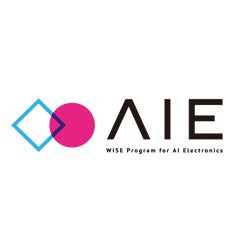 Division for Academia-Industry Collaborating Graduate Programs
Division for Academia-Industry Collaborating Graduate Programs
The Division for Academia-Industry Collaborating Graduate Programs educates doctoral students
who can solve social problems and innovate in society while leading the creation and
application of knowledge, and lead value creation, in the next generation.
Its goals are to plan, implement, and support educational programs by collaborating with companies and
research institutes at home and abroad in cooperation with related departments.
Specifically, we conduct university-wide and individual support, screening of students for this program,
approval of selected students, and also certification of program completion through a rigorous degree examination process.
Introduction to the programs
| Program name |  Advanced Graduate Program for Future Medicine and Health Care Advanced Graduate Program for Future Medicine and Health Care |
|---|---|
| Program Leader | Masanori Yamauchi Professor, M.D. Ph.D., Tohoku University School of Medicine |
| Program outline |
Our country is on the verge of becoming a superannuated society with a declining birthrate, a situation which no other industrialized nation has ever experienced before. Under the circumstances various challenges are arising in medical and health care, while social needs for these fields are rapidly changing. Those who will lead the next-generation of medicine will need the ability to define a desirable future society, identify problems and discern social demands, discover solutions and implement them in a rapidly-aging society. They are also required to innovate new values and create unconventional ideas and systems in the fields of medical and health care by promoting interdisciplinary approaches to integrate medicine, healthcare, engineering, economics and social sciences, including psychology. This program aims to foster excellent professionals who are capable of meeting these requirements in order to develop, implement and lead the next-generation of medicine – “Future Medicine supported by Data Science, Technology and Society (DTS)” that Tohoku University is proposing, and contribute to building a sustainable aging-friendly society where aged people are able to live self-sufficiently while maintaining their quality of life. |
| URL | https://www.fmhc.tohoku.ac.jp/ |
| Program name |  Wise Program for AI Electronics Wise Program for AI Electronics |
|---|---|
| Program Leader | Toshiro Kaneko Professor, Tohoku University, Graduate School of Engineering |
| Program outline |
In realization of Society 5.0※, it is necessary to plan for the fusion of the “software layer” and the “hardware layer” which could create high quality data. However, in the present graduate school curriculum, the majority of research and education is specialized for each algorithm (software layer) and device (hardware layer); furthermore, there is a problem of weakness in research development of the “architecture layer” to achieve processing of large amounts of data at high speed. To solve this problem, this program aims to drive the doctoral student to acquire the “vision” to examine all technological layers in AI Electronics (AI spin device “hardware layer”, AI data science “software layer”, and AI processor “architecture layer”) and all spaces from the “physical space” to “cyber space”, and to have “practical skills” for implementing solutions for social problems and creation of new values in consideration of business-academia collaboration. As a result, this program has the potential to produce talented doctors who can make a continuous innovations by rolling up technologies from different fields. * Society 5.0 represents the 5th form of society in our human history, chronologically following hunting, farming, industry, and information. The Fourth Industrial Revolution is creating new values and services one after another, bringing a richer life to all. |
| URL | https://www.aie.tohoku.ac.jp/english/ |
| Program name |  WISE program for Sustainability in the Dynamic Earth WISE program for Sustainability in the Dynamic Earth |
|---|---|
| Program Leader | Michihiko Nakamura Professor, Tohoku University, Graduate School of Science |
| Program outline |
Located at a convergent margin, Japan is a natural disaster-prone country. The Japanese have experienced one of the world’s largest and most tragic earthquakes and continue to endure volcanic eruptions today. Since the 2011 Tohoku Earthquake, seismic and geothermal activities in the Northeast Japan arc have altered drastically due to changes in tectonic stress. Long-term climate changes have also resulted in an increase in disaster risk. Besides natural hazards, many regions and industries in today’s Japanese society face common risks, including threats to the environment, energy security, nuclear safety, and natural resource supplies. In order to build a safe, secure, and sustainable society, we must foster the ability to prepare for and deal with risks compounded by a variety of environmental, social, and economic factors. The purpose of this program is to develop doctoral students who can look at the big picture, act on principle, and demonstrate leadership; they will solve problems with global awareness and sound communication skills. To do this, we will carry out campus-wide graduate education in science, engineering, and liberal arts, supplemented by project-based learning, in collaboration with private enterprises and world-class partner universities with international programs. Students who complete this program are expected to play an active role in a wide range of sectors. |
| URL | https://syde.tohoku.ac.jp/english/ |
| Program name |  Graduate Program for Green and Digital Innovation Graduate Program for Green and Digital Innovation |
|---|---|
| Program Leader | Izumi Muto Professor, Tohoku University, Graduate School of Engineering |
| Program outline |
People all around the world are united in their commitment to achieve a carbon-neutral future and to look after our environment. The development of innovative technologies designed to help us achieve these goals promise to bring enormous benefits to societies around the world. The key to developing these green technologies is for engineers and scientists across many disciplines to come together and create. Through interdisciplinary collaboration, we expect the new industries of the future to emerge. Unlike the highly focused learning of a traditional doctoral course, you will find that our new degree program takes an inter-disciplinary approach and includes a strong industry collaboration component. In addition to the specialized cutting-edge learning provided by the graduate schools in Tohoku University, the Graduate Program for Green and Digital Innovation has a strong practical learning component and provides opportunities for research to be done in cooperation with industry experts. By learning to maximize the potential of data science tools to provide better technologies for the societies of tomorrow, we are dedicated to developing the human resources the future needs. These men and women will be both specialists and master collaborators and will be capable of the innovation required to create the environmentally-friendly future we need. |
| URL | http://gredi.tohoku.ac.jp/ |
